-
CENTRES
Progammes & Centres
Location
 PDF Download
PDF Download 
Shoba Suri, Oommen C. Kurian and Arundhatie Biswas Kundal, The ORF SDGs Young Influencers Programme: Insights from the Pilot, February 2024, Observer Research Foundation.
The historic United Nations summit of September 2015 in New York saw the adoption of 17 Sustainable Development Goals (SDGs), as part of the 2030 Agenda for Sustainable Development. This became formally operational on 1 January 2016. By ratifying them, nations committed to step up their efforts to battle inequality, poverty, and climate change over the next 15 years.
The SDGs, also referred to as Global Goals, transcend merely eradicating poverty. They comprise a comprehensive framework for a balanced approach towards economic growth, social inclusion, and environmental sustainability. This concept is encapsulated in the “Irreconcilable Trinity”, which highlights the intricate interplay and balance between equity, efficiency, and sustainability.[1] The SDGs acknowledge the interconnected nature of global challenges and stress the importance of integrated solutions that address economic, social, and environmental aspects simultaneously. This multifaceted perspective is central to the SDGs, which aim to navigate the complex interdependencies and trade-offs among different goals to achieve inclusive and sustainable progress.
Governments are expected to take charge and provide national frameworks to accomplish these 17 goals (Fig. 1), even though the SDGs are not legally obligatory. Following up and evaluating the progress made in implementing them is mostly the responsibility of the individual countries which have ratified them, and this will call for timely, high-quality data collection. The regional evaluation and follow-up will draw from analyses at the national level and support global evaluation and follow-up. There are 17 goals, 169 targets, and 231 unique indicators in the SDG framework, 92 of which are connected to the environment.
Fig. 1: The UN Sustainable Development Goals
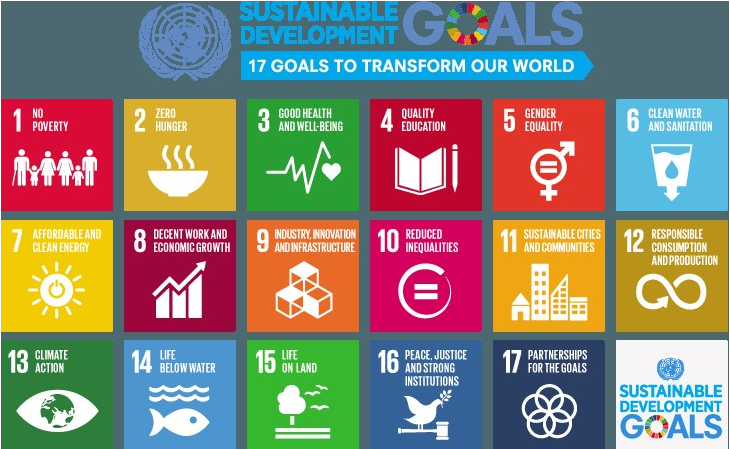
Source: United Nations-The 17 Goals[2]
There are 1.8 billion young people in the world between 10-24 years old, 90 percent of them living in developing nations.[3] This number is expected to rise further, with an estimated 1.9 billion young people reaching the age of 15 between 2015 and 2030.[4] This demographic dividend, especially in countries like India, is projected to last until around 2055-56 and could play a crucial role in driving the 2030 Agenda. The potential of India’s human-capital-induced development is rooted in its young people, who could actively contribute to their communities by advancing social justice, spurring political change, and finding innovative solutions to enhance community resilience. Their role as change agents is pivotal in promoting the SDGs.
To translate the 2030 Agenda into regional, national, and municipal policy, youth-led groups must be supported and given more authority. Young people aspire to make contributions and should be provided avenues to involve themselves in SDG-related programmes. They should be encouraged to look for solutions to SDG challenges during extracurricular activities, such as study tours, hackathons, learning and teaching programmes, and student leadership programmes. Events, campaigns and projects should be used to mobilise them to tackle SDGs.
The SDGs are a blueprint for a better and more sustainable future for all. However, they can only be achieved if all sections of society, including the youth, are actively engaged in pursuing them. In this context, ORF began an SDG outreach programme to engage with private as well as public school students in Delhi to elicit their views on specific policy questions around SDGs and also to show them how a think tank functions.
The objective was to stimulate student interest in the SDGs and show how they can play an active role in achieving them. It was customised to explain SDGs to students, discuss their implementation within the community, and also provide exposure to ORF’s research work. A great takeaway for the students participating in the programme was the opportunity to observe and participate in policy-related work within a think tank.
This report will discuss two pilot workshops, held in the ORF offices in New Delhi, the first with students of the private institution, Summer Fields School, and the second with those from the government-run Delhi Police Public School on 21 November and 8 December 2023, respectively. An average of 35-40 students between the ages of 13-17 attended each of the four-hour long workshops (Fig. 2), accompanied by two senior teachers. A short presentation by ORF on the 17 SDGs and their indicators in the context of the G20 Delhi Summit[a] set the stage. Students were then divided into four groups, representing four SDGs selected based on their direct alignment with the curriculum, with each group focusing on a separate SDG:[b]
Each group was given 90 minutes to brainstorm and design their own roadmap towards achieving its SDG, using whatever form of expression it preferred—e.g., poetry, artwork such as cartography, or simply writing down their ideas on white boards or chart paper. Actionable points and key recommendations were presented by a representative from each team, which was followed by a short discussion with the ORF faculty.
Figure 2: Workshop Design

The workshop with Summer Fields School students proved how concerned and knowledgeable today’s youth are about the Development Agenda. The gathering, which included students from different academic streams and had balanced gender representation, offered nuanced insights into how young minds want to address global challenges.
Most students attending this session, both boys and girls—mainly from Humanities and Commerce backgrounds—displayed a medium level of interest in the subject. They showed a keen understanding of the complexities surrounding global poverty and hunger. They sought universal access to food, recognising the dire consequences of food insecurity, notably on child health and growth. The discussion also touched upon broader economic aspects, with students suggesting measures to curb inflation and stabilise food prices. Transitioning towards sustainable agriculture and food production was a recurrent theme, highlighting the students’ grasp of the close relationship between economic policies and food security.
This discussion attracted a wide array of students across disciplines and gender. It included a critical examination of the National Education Policy 2020, with students voicing concerns about the lack of student involvement in policymaking. They underscored the importance of integrating vocational training in school curriculums and advocated an education system that balances theoretical knowledge with practical skills that will prepare them for challenges in the real world.
It was predominantly female students from the Humanities stream who came for this session. The discussion centred around issues such as combating violence against women and bridging the gender gap in higher education and the economy. Innovative and actionable ideas, such as the introduction of 'pink taxis' exclusively for women's transportation, were brought up. It showed that those attending were forward-thinking as they combined immediate, practical solutions with broader policy advocacy.
This SDG drew the highest interest, particularly from Science students. Participants discussed its various aspects, from promoting green transportation methods—such as Norway's electric vehicle policies which have made it the country with the highest number of electric vehicles per capita—to watershed development and river system management, where the Namami Gange project was cited as a successful model. Effective waste management and community cleanliness initiatives—like India’s Swachh Bharat and Rwanda’s Umuganda—were also highlighted. The discussions demonstrated the students' ability to connect global examples to local contexts, and indicated their deep understanding of environmental sustainability.
The workshop did not just provide a platform for students to express their concerns and ideas; it was a demonstration of their capacity to think critically, propose innovative solutions, and engage actively with global issues. The interactions showed the vital role of such forums in nurturing informed, proactive future leaders.
The workshop with students from the Delhi Police Public School (DPPS), New Police Lines, provided deep insights into how students from the Commerce and Humanities streams perceive and propose to address key SDGs.[c]
This topic evoked a medium level of interest among both boys and girls, most of them from the Commerce stream. They identified food insecurity as a critical issue in India, exacerbated by increasing population and poverty. They emphasised the need for availability, accessibility, and affordability of food. They suggested improving mid-day meals with more nutritious options and encouraging cultivation of kitchen and backyard gardens for domestic consumption. They advocated increased awareness of healthy consumption lifestyles, which showed their understanding of the broader societal implications of food security.
This goal garnered very high interest from students of both the Commerce and Humanities streams. They recognised quality education as vital for life success, and called for increased investment in educational infrastructure. They advocated innovative approaches to learning, which would increase student creativity. They highlighted the need to end all kinds of discrimination and foster diverse career options. Suggestions included reframing the curriculum to align more closely with student interests, and offering assistance and support to students in need, such as free uniforms and books. The role of parents was also emphasised, and regular workshops to enhance their involvement in school activities suggested.
This session attracted a large number of students from the Humanities section, both girls and boys. Participants critically examined structural gender inequalities in society and in educational settings. They discussed gender-based segregation in schools and the social stigma associated with cross-gender friendships. The need for counselling facilities in schools was highlighted, both for career guidance and personal well-being. The portrayal of women in the media, specifically the romanticised 'male gaze', was critically analysed. Students also strongly supported LGBTQ rights and emphasised that fostering gender equality required a change in mindset starting from the formative years.
This too, attracted high interest, particularly from boys in the Commerce stream. Students recognised climate change as the planet's most significant existential threat, drawing attention to its impacts like rising sea levels and extreme weather events. They proposed a shift to green energy sources as a key strategy to combat global warming. They emphasised the importance of sustainable living with affordable access to rainwater harvesting and wind, solar, and other renewable energies. They discussed waste segregation and promoting of sustainable, affordable housing in urban areas.
Overall, the workshop with DPPS students demonstrated their keen awareness of, and commitment to, addressing global challenges through the SDGs. Their suggestions were marked by a blend of practicality, innovation, and a deep sense of social responsibility.
The programme is still in its early stages. The current matrix, primarily derived from an analysis of group activities, will be mainly a representational tool. It is valuable for guiding future comparative analyses on the differences in response between students from affluent private schools and those from public schools.
These insights from the pilot phase will shape the future course of the programme. They emphasise the need for a more inclusive, comprehensive approach that takes into account the varied backgrounds and capabilities of students, striving for a more equitable and effective educational experience. Taking learnings from the pilot phase, future workshops will strive to be even more inclusive, effective, and engaging, ensuring that all students, regardless of background, have the opportunity to learn about and contribute to the SDGs. At the end of the cycle, a Young Influencers’ SDG Manifesto will be published, based on insights from the workshops.
|
Venue: ORF Conference Hall, New Delhi Timing: 09:00 am to 12:45 pm 09:00 Arrival of Students 09:30–10:00 Introduction/Welcome Address 10:00–10:15 Presentation on the SDGs/Brief introduction to ORF’s research footprint 10:15–10:25 Group Work Guidelines 10:25–11:15 Group Work Begins 11:15–11:45 Presentation by Group Rapporteur 11:45–12:00 Closing Group Photo & Distribution of Certificates 12:00–12:30 Refreshments/High Tea |
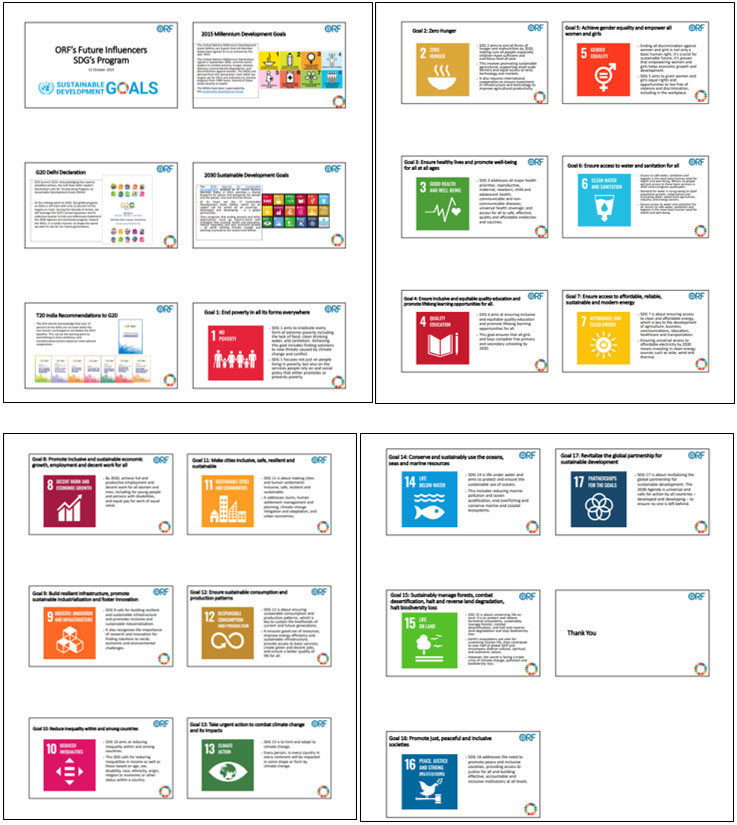
SDG 2: End hunger, achieve food security and improved nutrition and promote sustainable agriculture
Objective: Understand and strategise to eliminate hunger, achieve food security, improve nutrition, and promote sustainable agriculture.
Activity: Volunteers share insights from recent news items, research papers, reports, or documentaries that highlight issues or innovations related to the respective SDG.
Deep Dive & Brainstorming (30 minutes)
Objective: Analyse and ideate solutions to challenges in achieving this particular SDG.
Activity: Discuss a case study about a region or community facing challenges or innovating in areas related to this SDG.
Discussion Points: - Identify key challenges and strategies related to the SDG. - Explore innovative solutions and practices observed globally.
Developing Recommendations (15 minutes)
Objective: Formulate actionable recommendations.
Activity: Utilise brainstorming outputs to develop concrete recommendations.
Preparing for Presentation (5 minutes)
Objective: Synthesise information for plenary presentation.
Activity: Identify key points and recommendations to share in the plenary session.
Feedback and Finalisation (5 minutes)
Objective: Refine presentation content.
Activity: Peer review of the presentation content within the group.
SDG 4: Ensure inclusive and equitable quality education and promote lifelong learning opportunities for all
Objective: Investigate and strategise to ensure inclusive and equitable quality education.
Activity: Volunteers share insights from recent news items, research papers, reports, or documentaries that highlight issues or innovations related to the respective SDG.
Deep Dive and Brainstorming (30 minutes)
Objective: Analyse and ideate solutions to challenges in achieving this particular SDG.
Activity: Discuss a case study about a region or community facing challenges or innovating in areas related to this SDG.
Discussion Points: - Identify key challenges and strategies related to the SDG. - Explore innovative solutions and practices observed globally.
Developing Recommendations (15 minutes)
Objective: Formulate actionable recommendations.
Activity: Utilise brainstorming outputs to develop concrete recommendations.
Preparing for Presentation (5 minutes)
Objective: Synthesise information for plenary presentation.
Activity: Identify key points and recommendations to share in the plenary session.
Feedback and Finalisation (5 minutes)
Objective: Refine presentation content.
Activity: Peer review of the presentation content within the group.
SDG 5: Achieve gender equality and empower all women and girls
Objective: Understand and strategise to achieve gender equality and empower all women and girls.
Activity: Volunteers share insights from recent news items, research papers, reports, or documentaries that highlight issues or innovations related to the respective SDG.
Deep Dive and Brainstorming (30 minutes)
Objective: Analyse and ideate solutions to challenges in achieving this particular SDG.
Activity: Discuss a case study about a region or community facing challenges or innovating in areas related to the SDG.
Discussion Points: - Identify key challenges and strategies related to the SDG. - Explore innovative solutions and practices observed globally.
Developing Recommendations (15 minutes)
Objective: Formulate actionable recommendations.
Activity: Utilise brainstorming outputs to develop concrete recommendations.
Preparing for Presentation (5 minutes)
Objective: Synthesise information for plenary presentation.
Activity: Identify key points and recommendations to share in the plenary session.
Feedback and Finalisation (5 minutes)
Objective: Refine presentation content.
Activity: Peer review of the presentation content within the group.
SDG 13: Take urgent action to combat climate change and its impacts
Objective: Explore the significance of taking urgent action to combat climate change and its impacts.
Activity: Volunteers share insights from recent news items, research papers, reports, or documentaries that highlights issues or innovations related to the respective SDG.
Deep Dive & Brainstorming (30 minutes)
Objective: Analyse and ideate solutions to challenges in achieving this particular SDG.
Activity: Discuss a case study about a region or community facing challenges or innovating in areas related to the SDG.
Discussion Points: - Identify key challenges and strategies related to the SDG. - Explore innovative solutions and practices observed globally.
Developing Recommendations (15 minutes)
Objective: Formulate actionable recommendations.
Activity: Utilise brainstorming outputs to develop concrete recommendations.
Preparing for Presentation (5 minutes)
Objective: Synthesise information for plenary presentation.
Activity: Identify key points and recommendations to share in the plenary session.
Feedback and Finalisation (5 minutes)
Objective: Refine presentation content.
Activity: Peer review of the presentation content within the group.
| Student Grade X - Summer Fields School “Getting to understand the SDG indicators to track progress was an eye-opener. I will be incorporating this knowledge in my next MUN speech”. Student Grade XI - Delhi Police Public School “Your organisation has provoked my interest in policy research, I was unaware that this can be a promising career option.” |
| Summer Fields School “The students felt accomplished when they returned to school, with many showing off their certificate to their other teachers and friends”. Delhi Police Public School “Our students were very thankful for this opportunity and greatly appreciated the humble and informal way in which it was conducted”. |
[a] The G20 summit was held in Delhi on 9-10 September 2023.
[b] The set of SDGs will be broadened as we progress further in this project.
[c] DPPS offers only commerce and humanities courses.
[1] Nilanjan Ghosh, “Ecological Economics: Sustainability, Markets, and Global Change” (Modified version of the presidential address delivered at the Seventh Biennial Conference of the Indian Society for Ecological Economics, Tezpur University, Tezpur, Assam, December 5–8, 2013).
[2] United Nations-The 17 Goals, https://sdgs.un.org/goals
[3] United Nations, “Youth-Young People”.
[4] UNDP at the ECOSOC Youth Forum, April 20, 2023.
The views expressed above belong to the author(s). ORF research and analyses now available on Telegram! Click here to access our curated content — blogs, longforms and interviews.
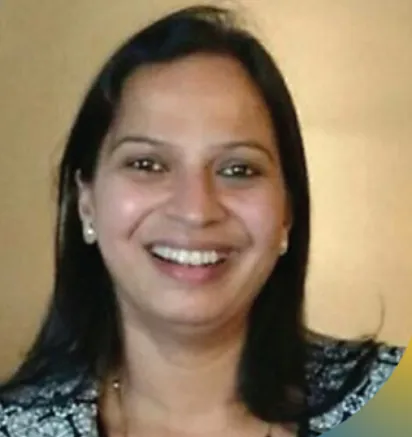
Dr. Shoba Suri is a Senior Fellow with ORFs Health Initiative. Shoba is a nutritionist with experience in community and clinical research. She has worked on nutrition, ...
Read More +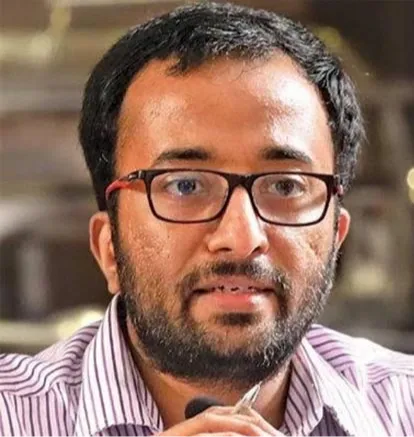
Oommen C. Kurian is Senior Fellow and Head of the Health Initiative at the Inclusive Growth and SDGs Programme, Observer Research Foundation. Trained in economics and ...
Read More +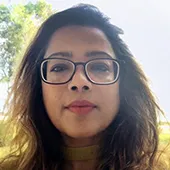
Arundhatie Biswas Kundal was a Senior Fellow Observer Research Foundation India ...
Read More +